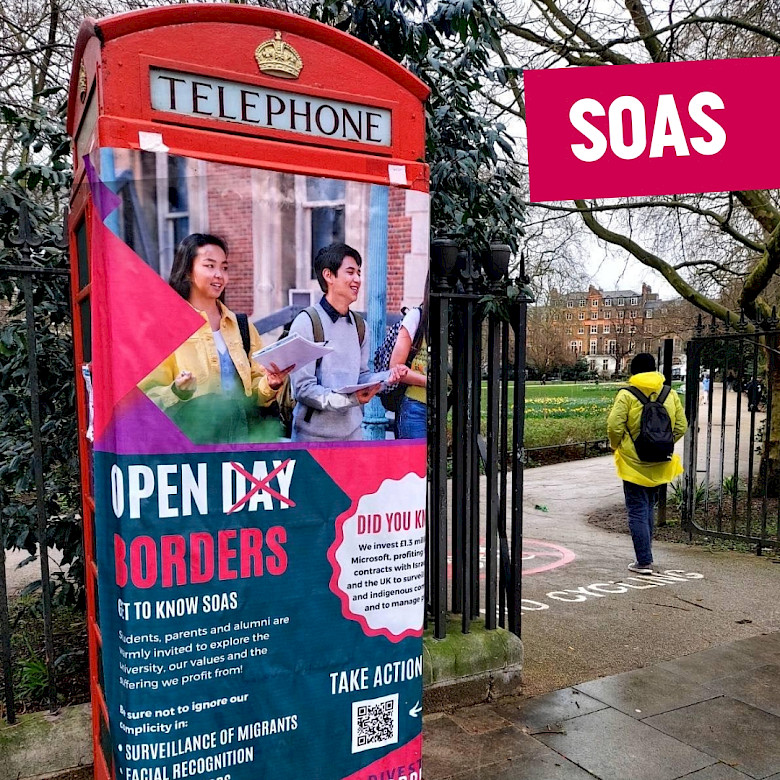Over the last 24 hours, student activists across the UK have carried out a coordinated subvertising action campaign demanding divestment from the border industry. Bus-stop sized posters resembling open day adverts have popped up in multiple universities cities and towns including Falmouth, Oxford, Sussex, Nottingham and London. The posters draw attention to the hypocrisy of institutions who endeavour to entice and exploit international students while continuing to invest in the companies who make the hostile environment a reality.
This action comes in the context of ongoing resistance to the government’s increasing hostility towards migrating people. As private companies profit from the business of bordering, students are refusing to allow their universities to remain complicit in the deportation, detention and surveillance of people seeking sanctuary. Research by People & Planet estimates that over £300 million of university endowments remain invested in the Border Industry, in addition to numerous research partnerships and service provision contracts.
Since launching in 2021, the Divest Borders campaign has gained public support from over 100 migration scholars and university workers from across 35 universities. In November 2023 we announced that The University of Kent, Northumbria University and Worcester University had joined Cardiff Metropolitan University in committing to exclude the Border Industry from their current and future investment portfolios. For the students organising on campuses across the UK, the demand for universities to cut ties with the Border Industry is made in solidarity with those frontline communities resisting border violence worldwide.
André Dallas, Co-Director of Migration Justice at People & Planet, said: “Students are sick and tired of hearing their universities branded as ‘welcoming’ and ‘international’ communities when they know that isn’t the case. They see their classmates scapegoated and deported, they encounter companies infamous for abuses at IRCs roaming campus, and they hear silence from management in the face of escalating violence against migrating people. If universities want to truly represent the values they claim, they must break all ties with the border industry and use their platform to help build a world where all are free to move or stay as they desire.”
Dr. Lucy Williams, Visiting Researcher at The University of Kent, said: “The hostile environment, facilitated and maintained by profit-making multi-national companies dehumanises all engaged in it - from refugees and asylum seekers, to the border officials and agency staff that maintain the system, to the landlords, medical practitioners and others whose work is limited by it and makes even the tax paying public complicit in the abuse of people seeking protection and a better chance in life. The news that the University of Kent has divested from companies that profit from border violence is therefore greatly to be welcomed.”
Simon Newitt, Chief Financial Officer of Northumbria University, said: “By choosing not to invest in industries that do not align with our vision for a better world, Northumbria sets an inspiring example for educational institutions globally. We believe in fostering a positive impact through our investments, and this step is in line with our dedication to a more inclusive and responsible future. This move not only showcases our dedication to positive change, but also underscores the powerful role universities play in driving progress towards a more sustainable and just future for all.”
Dr. Rachel Seoighe, Lecturer in Criminology at the University of Kent, said: "As academics, we expect our universities to be leading on the major social and environmental issues of our time. Our universities should be examining and exposing industries that systematically cause harm, not benefitting from them. We have a responsibility to contribute to building a better world and that includes challenging punitive and profit-driven border practices, and scrutinising the financial relationships that enable them.”






